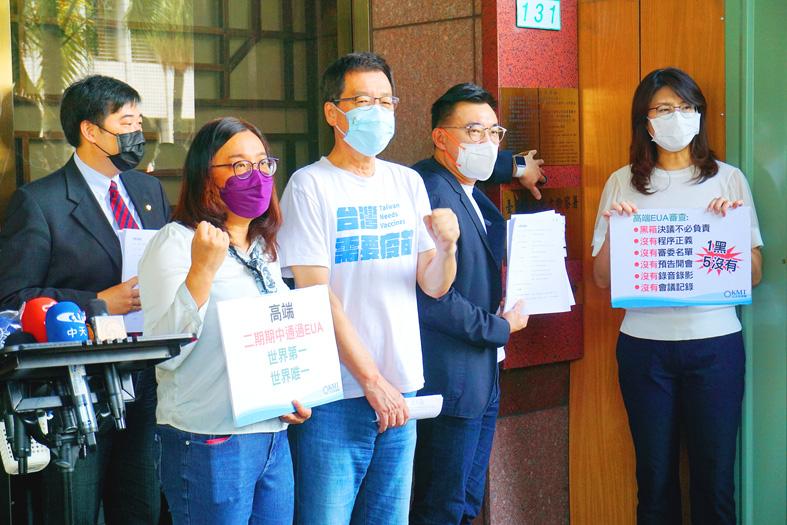The Chinese Nationalist Party (KMT) yesterday filed a lawsuit against Minister of Health and Welfare Chen Shih-chung (陳時中) and Food and Drug Administration (FDA) Director Wu Shou-mei (吳秀梅) alleging corruption in the decision to issue an emergency use authorization (EUA) for the COVID-19 vaccine developed by the Medigen Vaccine Biologic Corp (高端疫苗生物製劑).
The FDA had bypassed standard procedures and, in broad defiance of public and international opinion, decided to approve the vaccine, the KMT said.
Citing FDA data, KMT caucus secretary-general Cheng Li-wun (鄭麗文) said that Medigen started producing vaccines last month, before it received the EUA, which is evidence that the company was given assurances that its vaccine would be approved and made available for use by next month.

Photo: CNA
“We have become the only nation to approve an EUA for a vaccine that has not passed phase 3 clinical trials,” Cheng said.
Medigen yesterday said that it had received approval to conduct phase 3 clinical trials on 1,000 people in Paraguay.
KMT Chairman Johnny Chiang (江啟臣) cited the vaccine approval process in the US, saying that the process is recorded and that its review processes are transparent.
Taiwan, on the other hand, had not recorded the review process, he said, adding that the public does not know who attended the meeting, or what kind of opposition was voiced.
“We have set the lowest bar for vaccine approval worldwide,” Chiang said.
KMT Disciplinary Committee director Yeh Ching-yuan (葉慶元), who is the party’s legal representative, said that the procedures to approve domestic vaccines went against past practice, despite Taiwan having access to international vaccines and having no immediate need for them.
The FDA was guilty of corruption as it forced through the approval of the EUA by replacing half of the academics on the panel of specialists, Yeh said.
In response, Democratic Progressive Party caucus secretary-general Lo Chih-cheng (羅致政) said that the legislature would declassify and make public the minutes of the specialists’ meeting within two weeks.
At the specialists’ meeting, 18 members voted to approve the vaccine, one voted for further discussion after asking for more information and one voted to not approve the vaccine, Wu said on Monday, adding that the convener of the meeting was not allowed to vote.
Under the EUA, the company must provide a safety report every month, she said.

CHAOS: Iranians took to the streets playing celebratory music after reports of Khamenei’s death on Saturday, while mourners also gathered in Tehran yesterday Iranian Supreme Leader Ayatollah Ali Khamenei was killed in a major attack on Iran launched by Israel and the US, throwing the future of the Islamic republic into doubt and raising the risk of regional instability. Iranian state television and the state-run IRNA news agency announced the 86-year-old’s death early yesterday. US President Donald Trump said it gave Iranians their “greatest chance” to “take back” their country. The announcements came after a joint US and Israeli aerial bombardment that targeted Iranian military and governmental sites. Trump said the “heavy and pinpoint bombing” would continue through the week or as long

TRUST: The KMT said it respected the US’ timing and considerations, and hoped it would continue to honor its commitments to helping Taiwan bolster its defenses and deterrence US President Donald Trump is delaying a multibillion-dollar arms sale to Taiwan to ensure his visit to Beijing is successful, a New York Times report said. The weapons sales package has stalled in the US Department of State, the report said, citing US officials it did not identify. The White House has told agencies not to push forward ahead of Trump’s meeting with Chinese President Xi Jinping (習近平), it said. The two last month held a phone call to discuss trade and geopolitical flashpoints ahead of the summit. Xi raised the Taiwan issue and urged the US to handle arms sales to

BIG SPENDERS: Foreign investors bought the most Taiwan equities since 2005, signaling confidence that an AI boom would continue to benefit chipmakers Taiwan Semiconductor Manufacturing Co’s (TSMC, 台積電) market capitalization swelled to US$2 trillion for the first time following a 4.25 percent rally in its American depositary receipts (ADR) overnight, putting the world’s biggest contract chipmaker sixth on the list of the world’s biggest companies by market capitalization, just behind Amazon.com Inc. The site CompaniesMarketcap.com ranked TSMC ahead of Saudi Aramco and Meta Platforms Inc. The Taiwanese company’s ADRs on Tuesday surged to US$385.75 on the New York Stock Exchange, as strong demand for artificial intelligence (AI) applications led to chip supply constraints and boost revenue growth to record-breaking levels. Each TSMC ADR represents

State-run CPC Corp, Taiwan (CPC, 台灣中油) yesterday said that it had confirmed on Saturday night with its liquefied natural gas (LNG) and crude oil suppliers that shipments are proceeding as scheduled and that domestic supplies remain unaffected. The CPC yesterday announced the gasoline and diesel prices will rise by NT$0.2 and NT$0.4 per liter, respectively, starting Monday, citing Middle East tensions and blizzards in the eastern United States. CPC also iterated it has been reducing the proportion of crude oil imports from the Middle East and diversifying its supply sources in the past few years in response to geopolitical risks, expanding